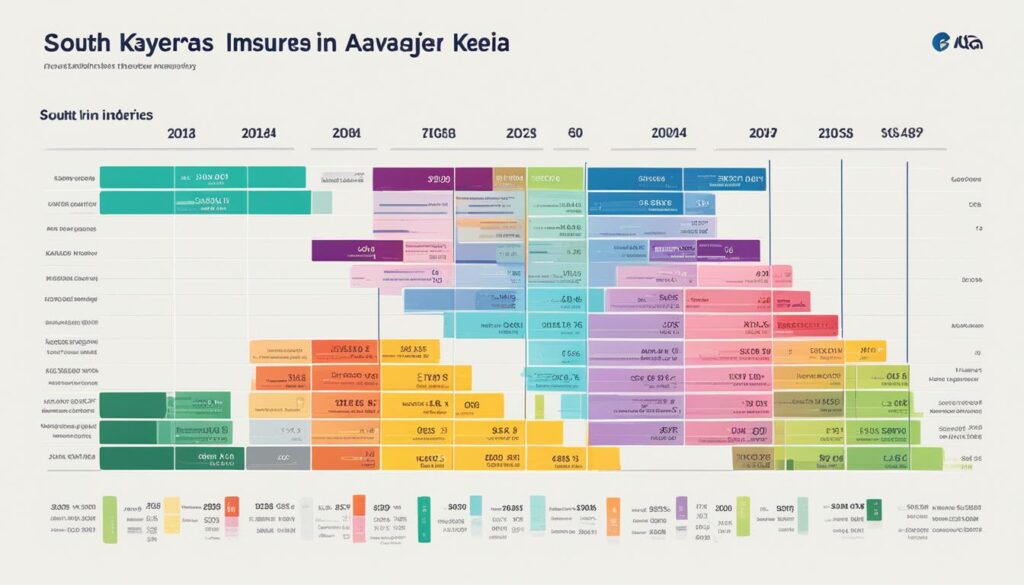The Average Salary in South Korea for 2025 stands at approximately ₩47,145,828 KRW per year, translating to about $35,786 USD. This figure is influenced by various factors, including economic conditions, industry types, and geographic locations. Notably, cities like Seoul feature significantly higher average wages, attributed to the presence of multinational corporations and the high cost of living. According to the latest South Korean Salary Statistics, the monthly earnings can vary widely across different sectors and regions, emphasizing the complexities in evaluating wage metrics. Additionally, changes in the labor market and advancements in technology continue to shape these salary trends, making it essential for employers and employees alike to stay informed. For a detailed look at the national average salary and regional variations, please visit this resource1.
Key Takeaways
- The average salary in South Korea is ₩47.1 million KRW per year, or approximately $35,786 USD.
- Higher salaries are typically found in major cities like Seoul due to economic activity and cost of living.
- Industry type has a considerable impact on salary ranges; for example, IT professionals earn significantly more.
- Geographic location plays a crucial role in salary variations across the country.
- Technological advancements and labor market changes continually influence wage statistics.
- Understanding the South Korea Average Wage is vital for both job seekers and employers.
Unlock Investment Opportunities Abroad!
Understanding the Average Salary in South Korea
The salary landscape in South Korea is marked by various trends and changes that reflect the nation’s economic growth. Currently, the Current Average Salary in South Korea stands at approximately ₩3,890,000 KRW per month, which showcases a steady increase when compared to previous years. Factors driving this rise include advancements in different industries and improvements in employment opportunities.
Current National Average Salary
In the past few years, South Korea Salary Trends have indicated a positive trajectory in average salaries. For instance, the salary range spans from ₩2,059,411 KRW for lower earners to around ₩6,240,003 KRW for higher earners, with the average salaries translating into a diverse income spectrum depending on various factors such as age, gender, and sector of employment2. The Median Salary in South Korea continues to evolve as insights reveal that men typically earn an average of ₩4,059,445 KRW, while women earn about ₩3,805,817 KRW, illustrating a notable gender pay gap of approximately 6.7%2.
Comparison With Previous Years
As South Korea’s job market progresses, diverse factors have influenced salary growth, reflecting broader industrial shifts and regional variances in wage structures. The escalation of the average salary has generally showcased resilience against economic fluctuations, driven by labor demand and an increase in skilled labor participation. Understanding these trends can assist both employees and employers in navigating the competitive job market landscape. Observing patterns in salary evolution can help organizations strategize their workforce and compensation models effectively for better results3.
Factors Influencing the Average Salary

Numerous factors contribute to the average salary levels in South Korea. The economic sector in which one works significantly impacts earning potential. For instance, professionals in finance and technology often report higher salaries compared to those in hospitality or retail. This economic sector variations can be reflected in South Korean Salary Statistics, revealing the vast differences in average earnings across industries.
Economic Sector Variations
The salary landscape in South Korea varies considerably by industry. For example, individuals in the IT sector earn approximately 5.6 million KRW per month, whereas those in manufacturing might see an average salary of around 4.2 million KRW monthly4. The health sector also offers competitive salaries, reflecting the demand for skilled professionals. Such variations are significant in driving decisions for career paths, with sectors like IT, finance, and healthcare consistently showing higher pay scales.
Impact of Education and Qualification
Education plays a crucial role in determining salary levels. South Korea exhibits a marked Education Impact on Salary, where individuals holding a bachelor’s degree can earn up to 40% more than those with only a high school diploma4. Furthermore, large firms tend to offer better pay hikes for those with advanced degrees. This educational disparity not only influences immediate salary but also impacts long-term career development.
Geographic Location Effects
Geographic Salary Variation is another vital factor in salary determination. For instance, salaries in metropolitan areas like Seoul are typically higher compared to those in rural regions. In fact, the average salary in Seoul can reach 52,319,400 KRW annually, while salaries in Busan are slightly lower at 51,479,800 KRW5. This difference is largely attributed to higher living costs and concentrated economic activities in urban areas. As such, individuals considering employment opportunities must take into account the potential geographic disparities affecting their earnings.
Understanding these diverse factors equips job seekers and employers alike with essential insights into the South Korean job market, enabling informed decisions aligned with both professional and economic ambitions.
South Korea Salary Statistics by Industry

Understanding the disparities in salaries across different sectors in South Korea reveals insightful trends. The landscape of salaries varies significantly, showing a noticeable difference between the highest-paying and lower-paying industries. In recent studies, it has become evident that as industries evolve, so do their salary structures. Investigating this data can aid job seekers in making informed career choices.
Highest-Paying Industries
Among the Highest-Paying Industries in South Korea, sectors like information technology, finance, and healthcare stand out. IT professionals earn an average salary of about 61.5 million Korean won annually, equivalent to approximately $54,500. Finance and banking employees earn around 66.2 million Korean won per year, reflecting the high demand for skilled workers in these sectors. Notably, engineers also benefit from lucrative salaries, often reaching about 52.3 million Korean won ($46,300) per year. Understanding the South Korea Salary Comparison by Industry provides clarity on which fields might offer better opportunities and career growth.
Industries with Lower Salary Ranges
Conversely, industries like retail, hospitality, and construction tend to have lower salary ranges. Many roles in these sectors start with salaries below 2 million Korean won monthly, highlighting the economic challenges faced by employees. Job seekers aiming for financial stability may want to consider transitioning into higher-paying fields to enhance their earning potential. For a detailed overview of salaries across various professions, you can explore further information here6.
Minimum Wage in South Korea

The framework of the Minimum Wage in South Korea is pivotal in establishing fair compensation for workers. As of January 1, 2025, the Current Minimum Wage Rates have been set at ₩9,860 per hour, showing a consistent upward trajectory since the significant 16.4% increase in 2018 which raised it to ₩7,5307. This ongoing adjustment aligns with the government’s strategy to address wage disparities and enhance living standards for low-income employees. The monthly equivalent of this rate stands at ₩2,060,7408.
Current Minimum Wage Rates
With the 2025 amendment, the minimum wage represents a 2.5% increase from the previous year’s rate of ₩9,6208. This increase not only positions South Korea’s minimum wage above those of neighboring countries, such as Japan and China, but it also influences the broader labor market dynamics. Approximately 3,347,000 workers, or 15.4% of wage earners, will be directly impacted by this adjustment, highlighting the extent of the Minimum Wage in South Korea’s reach8.
Unlock Investment Opportunities Abroad!
Impact of Minimum Wage on Job Market
The Minimum Wage Impact on Employment remains a topic of considerable debate. While the policy aims to provide stability for low-income workers, there are concerns regarding potential job losses, especially in small and medium-sized enterprises that struggle with operational costs due to increasing wage mandates9. Employers are often motivated to offer various allowances—such as performance bonuses and transportation reimbursement—to bolster overall compensation packages and navigate the constraints imposed by minimum wage increments here. Furthermore, failure to comply with minimum wage laws can result in severe penalties, including fines or prison sentences for offending employers9.
| Year | Minimum Wage (per hour) | Increase Rate |
|---|---|---|
| 2018 | ₩7,530 | 16.4% |
| 2019 | ₩8,350 | 10.9% |
| 2020 | ₩8,720 | 2.8% |
| 2021 | ₩9,000 | 1.5% |
| 2023 | ₩9,620 | New Rate |
| 2025 | ₩9,860 | 2.5% |
Gender Wage Gap in South Korea

The Gender Wage Gap in South Korea presents a significant challenge, revealing substantial disparities in Female vs. Male Earnings across various sectors. The latest figures indicate that women earn, on average, only 68.8 percent of what men do, which translates to a staggering 31.2 percent gender pay gap, the highest among OECD countries in 202210. The average wage of Korean workers stood at $48,922, accounting for 91.6 percent of the OECD members’ average11.
Statistics on Female vs. Male Earnings
The labor force participation rate for South Korean women is notably 20 percentage points lower than that of their male counterparts12. Moreover, unmarried women without children earn nearly 20 percent less than men in similar industry roles12. This disparity contributes to the overall Gender Wage Gap in South Korea, affecting socio-economic dynamics in the country.
Contributing Factors to the Gender Wage Gap
Several Factors Influencing Gender Pay include traditional gender roles and the lack of sufficient work-life balance options for working mothers. Women’s likelihood of entering and remaining in the workforce declines significantly following childbirth, which impacts their long-term earnings and career progression12. Additionally, women are often underrepresented in high-paying industries and leadership positions, further perpetuating the wage gap10.
South Korea Salary Comparison with Other Countries
When assessing the South Korea Salary Comparison, it is crucial to understand how the average salary in Asia positions South Korea within a global context. With an average gross monthly salary of 3,623,000 ₩ (approximately $2,603), South Korea surpasses countries like China and Japan while maintaining competitiveness with developed nations13. The increasing appeal for foreign workers in South Korea is largely driven by its favorable salary offerings, which are significantly higher than those in many Asian countries such as Myanmar, Nepal, and Bangladesh14.
Average Salary in Asia and Beyond
According to recent analyses, South Korea’s net average monthly salary stands at 3,000,000 ₩ (around $2,155), showcasing an impressive financial incentive for expatriates13. This figure positions South Korea among the countries with a net average monthly salary exceeding $2,000 in purchasing power parity (PPP), with its adjusted monthly income being about $3,88313. Comparative data indicates that South Korean employees at larger companies earned an average of 5,884,000 ₩ in 2022, 1.2 times more than their counterparts in Japan, which further illustrates South Korea’s advantageous status in the region14.
Implications for Foreign Workers and Businesses
The rise in the Foreign Workforce in South Korea creates abundant opportunities for international businesses aiming to extend their reach into Asian markets. Employers can benefit from a skilled labor force that possesses competitive advantages in income levels and work efficiency; South Korea’s labor productivity, however, stands at $49.4 per hour, ranking it lower than Japan14. The salary range from 2,059,411.00 KRW to 6,240,003.00 KRW shows the vast potential for earnings in the South Korean job market, which attracts talent globally2. Notably, managing director positions can yield an average monthly salary as high as 16,666,700 KRW, indicating the high financial stakes involved2.
Conclusion
The landscape of salaries in South Korea reflects an intricately woven tapestry influenced by economic growth, industry variations, and demographic shifts. Currently, the average monthly salary for a South Korean worker stands at approximately 3.2 million KRW, translating to about 2,700 USD as of 2021, while skilled professions such as software engineering and teaching have average annual salaries of around 50 million KRW and 30 million KRW, respectively15. Furthermore, the minimum wage has been set at 8,720 KRW per hour, impacting roughly 70% of the workforce who earn above this threshold15.
Examining the educational field, English teachers, depending on their qualifications and location, can earn between 1.5 to 3 million KRW monthly, with public schools offering standardized competitive salaries alongside essential benefits16. This highlights the significance of qualifications and personal choices in navigating the wage landscape in South Korea.
In summary, as South Korea continues to progress economically, staying informed about these salary trends is crucial for both employees and employers. The future of salaries in South Korea will likely be shaped by ongoing economic changes, emerging industries, and evolving labor dynamics, making it an essential topic for ongoing discussion17.
Unlock Investment Opportunities Abroad!
FAQ
What is the current average salary in South Korea?
How does the average salary in South Korea compare to previous years?
What factors influence salaries in South Korea?
Which industries offer the highest salaries in South Korea?
What is the current minimum wage in South Korea?
How does the minimum wage impact the job market in South Korea?
What is the gender wage gap in South Korea?
How does South Korea's average salary compare to other countries?
Source Links
- https://worldmetrics.org/average-korean-salary/
- https://www.paylab.com/kr/salaries-in-country
- https://www.oecdbetterlifeindex.org/countries/korea/
- https://talentup.io/blog/average-salary-in-south-korea/
- https://www.outsourceaccelerator.com/articles/average-salary-in-south-korea/
- https://worldmetrics.org/average-salary-in-south-korea/
- https://joinhorizons.com/countries/south-korea/hiring-employees/minimum-wage/
- https://www.kimchang.com/en/insights/detail.kc?sch_section=4&idx=27751
- https://en.wikipedia.org/wiki/Minimum_wage_in_South_Korea
- https://www.koreaherald.com/view.php?ud=20240523050548
- https://www.koreatimes.co.kr/www/biz/2024/07/602_375217.html
- https://mitsloan.mit.edu/centers-initiatives/institute-work-and-employment-research/understanding-south-koreas-gender-gaps-employment-and-wages
- https://en.wikipedia.org/wiki/List_of_Asian_countries_by_average_wage
- https://www.kedglobal.com/the-ked-view/newsView/ked202403180006
- https://www.ipgce.com/basic-pay-expectations-in-south-korea/
- https://teast.co/blog/teach-english-south-korea-salary
- https://en.wikipedia.org/wiki/Economy_of_South_Korea

Comments